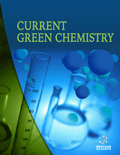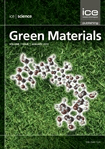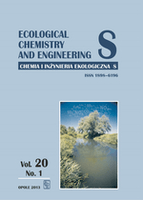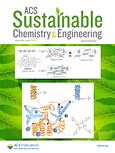
Green Chemistry Letters and Reviews
Scope & Guideline
Pioneering open access to green chemistry advancements.
Introduction
Aims and Scopes
- Green Synthesis Methods:
Research on environmentally benign methods for synthesizing nanoparticles, polymers, and other chemical compounds, often utilizing biological materials or waste products as reducing agents. - Waste Valorization:
Studies aimed at converting agricultural, industrial, and electronic waste into valuable products, including biofuels, biopolymers, and nanomaterials, highlighting sustainable practices. - Environmental Remediation:
Investigation into methods for removing pollutants from water and soil, including biosorption and advanced oxidation processes, to address contamination from heavy metals and dyes. - Sustainable Materials Development:
Development of new materials, such as biodegradable polymers and eco-friendly flame retardants, that reduce environmental impact and promote sustainability. - Education in Green Chemistry:
Innovative approaches to teaching green chemistry principles at various educational levels, aiming to integrate sustainability into the chemistry curriculum. - Applications of Green Chemistry:
Exploration of practical applications of green chemistry in diverse fields such as pharmaceuticals, agriculture, and energy, emphasizing the use of green solvents and catalysts.
Trending and Emerging
- Nanomaterial Synthesis and Applications:
A significant increase in research related to the green synthesis of nanomaterials, particularly using plant extracts, is evident. These materials are being explored for various applications, including catalysis, drug delivery, and environmental remediation. - Biobased and Biodegradable Polymers:
There is a growing trend towards developing biobased and biodegradable materials as alternatives to conventional plastics, reflecting an urgent need for sustainability in materials science. - Microbial and Plant-Mediated Synthesis:
Emerging research is highlighting the use of microorganisms and plant extracts for synthesizing nanoparticles and other compounds, showcasing the potential of biological methods in green chemistry. - Integrated Approaches to Waste Management:
Research is increasingly focusing on integrated waste management strategies that combine recycling, valorization, and sustainable practices to minimize environmental impact. - Environmental Impact Assessments:
A trend towards conducting life cycle assessments and environmental impact studies for new chemical processes and products is evident, ensuring that sustainability is at the forefront of chemical innovation. - Education and Outreach in Green Chemistry:
An emerging focus on incorporating green chemistry principles into educational curricula is gaining momentum, aiming to equip future chemists with the skills needed for sustainable practices.
Declining or Waning
- Traditional Organic Synthesis:
There is a noticeable decline in studies focusing solely on traditional organic synthesis methods, as the emphasis shifts towards greener, more sustainable alternatives. - Conventional Solvent Use:
Research involving conventional solvents is becoming less frequent, with a growing preference for solvent-free reactions or the use of green solvents. - Heavy Metal Catalysis:
The exploration of heavy metal catalysts in green chemistry is decreasing as researchers seek to minimize toxicity and environmental impact, favoring biocatalysts and transition metal-free approaches. - Single-Use Plastics:
Discussions around single-use plastics are diminishing, likely due to a broader awareness and focus on biodegradable materials and sustainable alternatives. - Basic Laboratory Techniques:
There is a waning interest in basic laboratory techniques that do not incorporate green principles, as the field increasingly prioritizes innovative and environmentally friendly methodologies.
Similar Journals

JOURNAL OF THE INDIAN CHEMICAL SOCIETY
Fostering Innovation in Diverse Chemical DisciplinesJournal of the Indian Chemical Society, published by Elsevier, stands as a cornerstone in the field of chemistry, particularly representing the rich chemical research emanating from India.
With a significant history dating back to its establishment, this journal encompasses diverse disciplines including Drug Discovery, Electrochemistry, Inorganic Chemistry, Organic Chemistry, and Physical and Theoretical Chemistry, reflecting the evolving landscape of chemical sciences.
Despite being positioned in the Q3 category across multiple quarters, the journal demonstrates promising rankings in various chemistries, highlighting its commitment to advancing the knowledge and application of chemical sciences. While currently not available as an open access journal, the Journal of the Indian Chemical Society is dedicated to providing a platform for high-quality research that fosters innovation and collaboration among researchers, professionals, and students worldwide.
With its continuous publication from 1973 to the present, it serves as an essential repository for cutting-edge findings and developments in chemistry, striving to connect academia with industry and practice.

Current Green Chemistry
Fostering innovation in environmentally conscious chemistry.Current Green Chemistry, published by Bentham Science Publishers, is a pivotal scholarly resource devoted to advancing the field of green chemistry. With ISSN 2213-3461 and E-ISSN 2213-347X, this journal serves as a crucial platform for researchers and professionals to explore innovative and sustainable practices within the chemical sciences. The journal has demonstrated significant recognition, evidenced by its categorization in the third quartile (Q3) across various specializations including Analytical Chemistry and Inorganic Chemistry, and even a fourth quartile (Q4) in Organic Chemistry, according to the latest Scopus metrics. This indicates a growing influence in relevant fields, making it a valuable reference for contemporary environmental initiatives. The journal's accessible nature, although not open access, ensures researchers can still engage with high-quality, peer-reviewed content. Spanning an impressive converged period from 2019 to 2024, Current Green Chemistry is committed to enhancing the visibility of groundbreaking research that aligns with sustainable development objectives, making it an essential resource for anyone interested in the future of chemistry.

Green Materials
Advancing sustainable solutions in materials science.Green Materials, published by Emerald Group Publishing Ltd, serves as a crucial platform for research within the realm of sustainable materials science. Since its inception in 2013, this journal has focused on addressing pressing global challenges, particularly in Materials Chemistry, Pollution, and Polymers and Plastics, as evidenced by its rankings within the Q3 Quartiles. With a commitment to high-quality, peer-reviewed content, it caters to an audience keen on innovative solutions that promote environmental sustainability. Researchers and professionals can access a wealth of knowledge and insights that are instrumental in advancing the field, despite the absence of an open-access option. As the journal continues to converge towards its projected endpoint in 2024, it remains a vital resource for those dedicated to exploring the intersection of materials science and ecological responsibility, ensuring its relevance in academic discussions and practical applications.

JOURNAL OF THE CHEMICAL SOCIETY OF PAKISTAN
Fostering Scientific Dialogue in Chemistry.JOURNAL OF THE CHEMICAL SOCIETY OF PAKISTAN is a premier academic journal published by the Chemical Society of Pakistan, focusing on advancing the field of chemistry through rigorous research and scholarship. Established in 1996, this journal aims to disseminate high-quality research articles, reviews, and insights pertaining to various subfields of chemistry, making substantial contributions to both local and international scientific communities. With a current impact factor placing it in the Q4 category, the journal continues to foster discussions on emerging trends and innovations within the discipline. Additionally, it holds a Scopus rank of #305 out of 408, highlighting its growing influence despite being positioned in the 25th percentile. Although it is not an open-access journal, it provides a crucial platform for researchers and professionals in Pakistan and worldwide. The JOURNAL OF THE CHEMICAL SOCIETY OF PAKISTAN serves as a valuable resource for students, educators, and industry professionals alike, facilitating the exchange of knowledge and promoting advancements in chemical sciences.

RUSSIAN CHEMICAL REVIEWS
Elevating Chemical Understanding GloballyRUSSIAN CHEMICAL REVIEWS, published by the esteemed ND Zelinsky Institute of Organic Chemistry, RAS, stands as a prominent platform for disseminating high-quality research in the diverse field of chemistry. With an ISSN of 0036-021X and an E-ISSN of 1468-4837, this journal has earned its place in the Q1 quartile of Chemistry (miscellaneous) for 2023, reflecting its outstanding impact and rigorous peer-review process. The journal encompasses a wide array of topics within chemistry, providing critical reviews that advance understanding and foster collaboration among researchers, professionals, and students globally. With its consistent publication since 1970, RUSSIAN CHEMICAL REVIEWS not only serves as a valuable resource for the latest advancements in the field but also plays a crucial role in shaping future research directions. The journal is based in the Russian Federation, with its office located at 47 Leninsky Pr, Moscow 119991, RUSSIA. As an essential reference for those in the chemical sciences, it provides an ideal avenue for authors looking to publish impactful reviews that contribute to the broader scientific community.

BMC Chemistry
Unlocking the Future of Chemistry with Open AccessBMC Chemistry, published by BMC, is a reputable open access journal that has made significant strides since its inception in 2019. Operating under e-ISSN 2661-801X, this journal is dedicated to advancing the field of general chemistry by promoting high-quality research across various sub-disciplines. Headquartered in the United Kingdom, BMC Chemistry boasts a commendable impact factor and is classified in Q2 within the prestigious field of Chemistry (miscellaneous) according to the 2023 category quartiles. The journal's Scopus ranking places it at #139 out of 408 in its category, highlighting its growing relevance and influence in the academic community, with a commendable 66th percentile standing. With a commitment to open access, BMC Chemistry ensures that groundbreaking discoveries and innovative research are available to a global audience, fostering collaboration and development in chemistry. Researchers, professionals, and students alike will find this journal to be an invaluable resource for disseminating knowledge and driving scientific advancement.

REVIEWS IN INORGANIC CHEMISTRY
Pioneering Knowledge in Inorganic ChemistryREVIEWS IN INORGANIC CHEMISTRY, published by Walter de Gruyter GmbH, is a distinguished academic journal that serves as a vital resource for researchers, professionals, and students within the field of inorganic chemistry. With its ISSN 0193-4929 and E-ISSN 2191-0227, this journal has made a significant impact on the discipline, holding a commendable Q2 ranking in the 2023 category of Inorganic Chemistry, placing it in the 81st percentile among its peers according to Scopus rankings. Continuously published since its inception, with converged years spanning from 1985 to 1990 and 1992 to 2024, it features comprehensive reviews encompassing the latest advancements, methodologies, and theoretical frameworks in the subject. Researchers will find IDEAL insights and valuable discussions that keep them abreast of trends and challenges in the domain, essential for driving innovation and collaboration. The journal’s commitment to quality and rigorous peer review highlights its importance in advancing inorganic chemistry research, making it an indispensable tool for academic excellence.

Ecological Chemistry and Engineering S-Chemia I Inzynieria Ekologiczna S
Transforming Knowledge into Ecological ActionEcological Chemistry and Engineering S, a prominent journal in the field of Environmental Chemistry and Engineering, provides a platform for innovative research and critical discussions surrounding ecological solutions and sustainable practices. Published by SCIENDO, this peer-reviewed journal is accessible to researchers and professionals dedicated to advancing our understanding of ecological systems and sustainable engineering practices. With an ISSN of 1898-6196 and an E-ISSN of 2084-4549, the journal has established itself in the academic community, reflected by its Q3 ranking in both Environmental Chemistry and Environmental Engineering categories as of 2023. Covering significant advancements from 2008 to 2024, it serves as an essential resource in advancing knowledge and fostering collaborations within interdisciplinary fields. Despite not offering open access, the journal remains an invaluable resource for researchers and students aiming to contribute to ecological sustainability strategies worldwide.

CCS Chemistry
Pioneering Discoveries in the World of ChemistryCCS Chemistry, published by the esteemed Chinese Chemical Society, is a leading open-access journal dedicated to advancing the field of chemistry. Since its inception in 2019, the journal has rapidly gained recognition, achieving a remarkable impact factor that places it in the prestigious Q1 category in Chemistry (Miscellaneous) as of 2023. With a Scopus ranking of #41 out of 408 in General Chemistry, CCS Chemistry represents the top 10th percentile in its category, reflecting its commitment to high-quality research and innovation. The journal serves as a vital platform for researchers and professionals to share their findings, showcase cutting-edge methodologies, and engage with the latest developments in various chemistry subfields. Accessible to a global audience, CCS Chemistry ensures that groundbreaking research is available without barriers, making it an indispensable resource for students and academics aiming to stay at the forefront of chemical sciences. For further details, submissions, and access to published articles, please visit the journal's website.

ACS Sustainable Chemistry & Engineering
Elevating sustainable practices in chemical sciences.ACS Sustainable Chemistry & Engineering is a premier journal published by the American Chemical Society, dedicated to advancing knowledge and innovation in the fields of sustainable chemistry and engineering. With an impressive impact factor and a consistent ranking in the Q1 category across various disciplines such as Chemical Engineering, Chemistry, Environmental Chemistry, and Renewable Energy, this journal serves as a vital resource for researchers, professionals, and students alike. Since its inception in 2013, the journal has been committed to publishing high-quality, peer-reviewed articles that address the critical challenges of sustainability in chemistry and engineering. With no open-access option currently available, the journal emphasizes the importance of premium scholarly communication. As the field continues to evolve, ACS Sustainable Chemistry & Engineering remains at the forefront of providing cutting-edge research that impacts our understanding and application of sustainable practices in the chemical sciences.